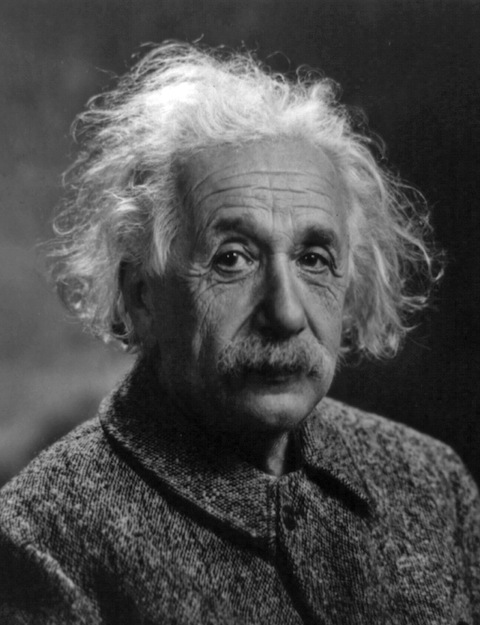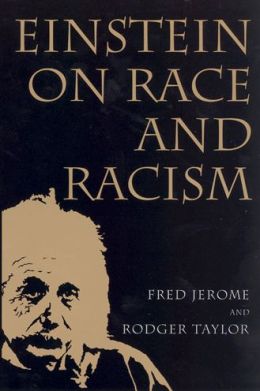General Discussion
Related: Editorials & Other Articles, Issue Forums, Alliance Forums, Region ForumsAlbert Einstein Called Racism “A Disease of White People” in His Little-Known Fight for Civil Rights

Albert Einstein’s activities as a passionate advocate for peace were well-documented during his lifetime. His celebrity as a famous physicist and one of the world’s most recognizable faces lent a great deal of weight to his pacifism, a view otherwise not given much consideration in the popular press at almost any time in history. However, according to a 2006 book titled Einstein on Race and Racism by Fred Jerome and Roger Taylor, the scientist was also as passionate about combating racism and segregation as he was about combating war. This facet of Einstein’s life was virtually ignored by the media, as was a visit he made in 1946 to Lincoln University in Pennsylvania, the first degree-granting college for African-Americans and the alma mater of Langston Hughes and Thurgood Marshall.
Invited to Lincoln to receive an honorary degree, Einstein gave a lecture on physics but also bluntly addressed the racial animus that held the country in its grip, reportedly calling racism, “a disease of white people” and saying he “did not intend to be quiet” about his opposition to segregation and racist public policy. Lest anyone think the Nobel-prize-winning physicist was pandering to his audience, the Harvard Gazette offers a comprehensive summary of Einstein’s support of progressive anti-racist causes, including his personal support of members of Princeton’s black community (he paid one man’s college tuition), a town Princeton native Paul Robeson once called “the northernmost town in the south.”
Einstein formed relationships with several prominent black leaders—inviting opera singer Marian Anderson to stay in his home after she was refused a room at the Nassau Inn and appearing as a character witness for W.E.B. Dubois when the latter stood accused of “failing to register as a foreign agent.” But it was his 20-year friendship with Robeson that seems central to his involvement in civil rights causes. The Harvard Gazette writes:
Einstein met Paul Robeson when the famous singer and actor came to perform at Princeton’s McCarter Theatre in 1935. The two found they had much in common. Both were concerned about the rise of fascism, and both gave their support to efforts to defend the democratically elected government of Spain against the fascist forces of Francisco Franco. Einstein and Robeson also worked together on the American Crusade to End Lynching, in response to an upsurge in racial murders as black soldiers returned home in the aftermath of World War II.
http://www.openculture.com/2013/08/albert-einstein-civil-rights-activist.html
Albert Einstein And Segregation In America

“Einstein, when he arrived in America, was shocked at how Black Americans were treated. “There is separation of colored people from white people in the United States,” he said. “That separation is not a disease of colored people. It is a disease of white people. And, I do not intend to be quiet about it.”
And, he wasn’t. Although he had a fear of speaking in public, he made all the effort he could to spread the word of equality, denouncing racism and segregation and becoming a huge proponent of civil rights even before the term became fashionable. Einstein was a member of several civil rights groups (including the Princeton chapter of the NAACP).
http://nedhardy.com/2013/04/22/albert-einstein-and-segregation-in-america/
Xipe Totec
(43,890 posts)shenmue
(38,506 posts)He was even cooler than I thought. ![]()
sheshe2
(83,746 posts)shenmue
(38,506 posts)Tree-Hugger
(3,370 posts)I never knew this. Thanks for sharing. ![]()
G_j
(40,367 posts)Thank you!
AverageJoe90
(10,745 posts)sheshe2
(83,746 posts)azmom
(5,208 posts)He is a favorite of mine.
Number23
(24,544 posts)ReRe
(10,597 posts)... how wonderful it would have been to live in his time and been a friend. He was an amazing man. Thanks, sheshe, for this OP!
calimary
(81,220 posts)Thanks for this! Even more reason to admire this gent.
sheshe2
(83,746 posts)I keep educating myself. That's why I love my computer, I seek, I search and learn. I toss in buzz words and sometimes find an article I like or I hit images and follow a story there.
I wish more people in the world would do the same, seek knowledge, follow the links, educate. Without the knowledge we will die.
He was a great man in so many ways, he had a heart and a brain and he used them.
I so love you calimary.
calimary
(81,220 posts)Your posts are always nourishing to the spirit. They certainly help to uplift me. I bet a lot of other DUers feel the same.
noiretextatique
(27,275 posts)It is a disease.
sheshe2
(83,746 posts)It is an ugly disease that rots your very soul.
noiretextatique
(27,275 posts)and there you have that, friend. the patient does not WANT to be cured.
Judi Lynn
(160,525 posts)Cha
(297,160 posts)sheshe2
(83,746 posts)Even through his fear, he over came that to spread the word.
nt
